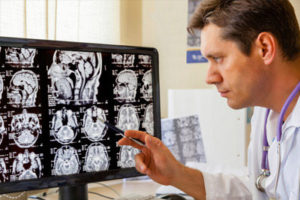Traumatic Brain Injuries
 Click here to tell us about your injuries
Click here to tell us about your injuries
The Centers for Disease Control estimates that, in the United States alone, there are approximately 5.3 million children and adults (or 2% of the U.S. population) currently living with a traumatic brain injury (TBI). Approximately 2 million people suffer brain injuries every year. From these brain injuries, many Americans suffer long-term disability. While vehicle accidents cause the majority of all brain injuries, falls are the second leading cause and are the prevalent cause of brain injury for the elderly.
Types of Head Injuries
A traumatic brain injury (TBI) is also called an acquired brain injury or simply a head injury. A traumatic brain injury occurs when a sudden trauma causes damage to the brain. A brain injury can result when the head strikes an object (closed head injury) or when an object actually pierces the skull and enters the brain tissue (open or penetrating head injury). A person who suffers such a head injury may have symptoms ranging from mild, moderate, to severe.
Symptoms of a Brain or Head Injury
TBI patients have been described as the “walking wounded” since many TBI sufferers have emotional or behavioral problems which can be difficult to handle. Many TBI patients can be helped by medication and psychotherapy. Often, TBI patients are more adversely affected by their emotional problems than by their residual physical disabilities.
As for physical disabilities, a TBI sufferer may experience loss of consciousness or may remain conscious. Other potential symptoms of a traumatic brain injury include headache, confusion, lightheadedness, dizziness, blurred vision, tired eyes, ringing in the ears, fatigue, bad taste in the mouth, change in sleep patterns, behavioral or mood changes, and trouble with memory, concentration, or thinking. For more severe head injuries, the victim may experience a headache which worsens or does not go away, vomiting or nausea, convulsions or seizures, an inability to awaken from sleep, dilation of the pupils, slurred speech, weakness or numbness, and increased confusion, restlessness, or agitation. Recovery from cognitive deficits is greatest within the first 6 months after the injury and more gradual after that.
Alzheimer’s Disease (AD) is a progressive, neurodegenerative disease characterized by dementia, memory loss, and deteriorating cognitive abilities. Research suggests an association between a head injury in early adulthood and the development of Alzheimer’s Disease later in life. The more severe the brain injury, the greater the risk of developing Alzheimer’s Disease.
Treatment for Brain Injury Sufferers
Anyone who experiences any of the signs or symptoms of a traumatic brain injury should seek medical attention immediately. Once the brain is injured due to trauma, little can be done to reverse the initial damage. However, medical professionals attempt to stabilize individuals with brain injuries and focus on preventing further damage. Medical professionals will be primarily concerned with insuring proper oxygen supply to the brain and the rest of the body and monitoring blood pressure. A skull or neck x-ray may be performed to check for bone fractures or spinal instability. Those whose head injuries are more severe may receive rehabilitation involving physical therapy, occupational therapy, speech/language therapy, physiatry (physical medicine), psychology (for example a neuropsychological evaluation), psychiatry, and social support.
The attorneys at the Ritchie Law Firm can help you obtain the appropriate medical treatment for your injury. Our firm can arrange for a neuropsychological and rehabilitation assessment to help prepare your case for litigation. We will also retain an expert economist, if appropriate, to project your lost wages and lost earning capacity.
Handling a Traumatic Brain Injury Case (TBI)
Unfortunately, many brain injury victims do not receive adequate legal representation for their claims because their attorney does not have experience with traumatic brain injury cases. Often the blame for an inadequate result in a brain injury case rests with the lawyer who did not have adequate experience to analyze, prepare, and properly present the claim. When selecting an attorney for your brain injury case, you should ask about the settlements or verdicts that lawyer has obtained in traumatic brain injury cases. You also should ask how often the lawyer attends seminars or conferences to remain current on traumatic brain injury issues.
The lawyers at the Ritchie Law Firm specialize in traumatic brain injury cases, and we have many years of experience in handling such complex matters. At the outset of representation, our team of experienced lawyers will review your medical records, assist with obtaining the proper medical treatment, monitor the rehabilitation plan, and ensure that a neuropsychological evaluation is obtained to determine the full extent of the head injury. As the case progresses, our lawyers will coordinate expert witnesses and ensure that your case is properly prepared for litigation, if necessary.
The Ritchie Law Firm team is committed to spending time with you and your family to completely understand how your injury has affected your life. We will thoroughly explain your rights to you. Because of your injury, your circumstances may seem overwhelming. We will try to make your life easier by handling all aspects of your claim and by putting you in touch with support groups and medical assistance.
At the Ritchie Law Firm, we work hard to protect the rights of our clients.
Call us today at
1-800-277-6124 or click here to tell us about your injuries.
We look forward to helping you.
The lawyer you choose can make a difference
Call the Ritchie Law Firm To Protect Your Rights
1-800-277-6124
